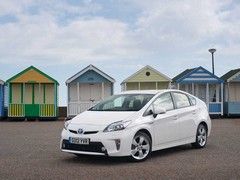NEDC mpg tests don't lie: Tell Me I'm Wrong
In the wake of a certain diesel-related scandal Dan argues the case for keeping the tests as they are

In respectful disagreement with my colleague Matt Prior on Autocar I think the same can be said for the current NEDC fuel consumption and CO2 figures. You know, the ones your car probably doesn't get anywhere near. The ones manufacturers work so hard to achieve and boast about in their marketing material. Similar ones to those Volkswagen engineered its cars to hit as and when required so it could sell diesel cars to Americans.
Usually this kind of thing has bubbled away in the background and in the consumer pages whose readers are exercised enough about their Kia Picanto not making the claimed mpg they feel moved to write and ask why. But, thanks to VW, emissions and mpg testing - and the claims made by manufacturers off the back of them - have become mainstream news. Meaning an awful lot of generally ill-informed but incredibly self-righteous stories about how the carmaking mega corporations lied to us.
They didn't really. They just engineered their cars to play the system and told consumers and testers what we wanted to hear. And their inspiration to paint their cars as greener than they actually are is not the fault of the test, more that of the politicians and legislating bodies who use the data as a basis for taxation and means of influencing people's buying decisions.
Because hand on heart, anyone who really cares about what comes out of a car's exhaust pipe wouldn't drive a car. Who honestly selects a vehicle on its mpg or CO2 rating out of a desire to save the planet? Nobody. If fuel cost less than 20p a litre and VED was a flat rate we'd all merrily drive sod-off V8s and be environmentally damned. Like many do in countries where petrol is cheaper than water.
But in markets where a few mpg or g/km here or there can make the difference between a car being affordable or not it's straightforward logic manufacturers use a combination of engineering and marketing to convince us we can have our cake and eat it. Performance from a twin-turbo V8 that, by the numbers, seemingly is no more polluting than a 1.0-litre three-cylinder in a supermini? I'll have a piece of that!
And here's why the NEDC remains valid. Because, unrealistic about what a car will actually achieve or not, it's a controlled evaluation that applies a common standard to every car tested. Nobody drives a car like it is run on the test. But that's exactly the point. It's a laboratory test. How on earth could a 'real world' test ever hope to deliver consistent results?
As it stands you can see how one car performs on the test against another of comparable price, performance and engine size. That may or may not indicate what you'll get out of it on the road. But it's at least a benchmark - a piece of evidence - to compare one car with another. As consumers we need to be more realistic and honest with ourselves. Scrutiny of facts, figures and the reasons we're being fed them is healthy, whether you're consuming news or stats used as marketing fodder.
The carmakers can't lay the blame entirely at the legislators' door though. They need to be more honest about how they use and publicise this data. If Mr Higgins in Tunbridge Wells bought his diesel supermini because the advert said it would do a certain mpg and it doesn't he's got a right to be cross. And we need to be more honest with ourselves and accept that, whatever engine our car has, if it's run of the mill hatchback, saloon or crossover it'll probably do somewhere between 30 and 40mpg in normal use and pump out an amount of noxious emissions in the process. So keep the test. Just ask more questions about how the results are used.
[Rolling coal image: GreenCarReports]
So isn't it also reasonable to assume that the lab tests could be tuned to more accurately reflect real world conditions? I don't know what the test consists of...but presume it's the car in a closed environment with the engine running at various speeds in various gears with various simulated conditions/temperatures etc. Do they use a rolling road? If so, could that not be adjusted to provide more resistance?
I'm kind of mixed on this one, for me I've largely been able to get somewhere close to the combined mpg figure quoted. My RS6 I averaged over 2k miles 19.4mpg against a quoted 20.2, my current A8 is sitting at 22.8mpg against an official 26 (although I've only had the car a week I expect the long term average to come up to c25). My one and only new car the glamorous A6 2.0 tdie averaged 52.3mpg over 22,000 versus an official 53.2mpg and my 330d had a 10k average of 45mpg against an official 41.5.
However I largely drive in a sedate manner and don't hoon it around everywhere like I stole it (save for the RS6 in its last week or so of ownership!). Seems like a lot of people drive in a digital manner (full acceleration / full brake) which is never going to help efficiency.
Suppose what I'm getting at is my driving style, by and large, is more akin to how the NEDC works, softer accleration and braking, more distance driving than town all helping me get close to official figures whereas I suspect a lot of other people drive in a more aggressive manner and/or do solely or largely town driving then moan when they don't hit the official figures!
[/quote]
Not sure about that! Not everyone is a petrol head.
I know numerous environmentally conscious people who would quite like to not drive at all but have to as it's the only viable form of transport for them. MPG and emissions are very important to them.
For example, (based on figures from fuelly):
Mk5 golf gti official figure is 35mpg, real world is 30mpg. Difference = 5mpg or roughly 15%
Mk7 golf gti official figure is 47mpg, real world is 33mpg. Difference = 14mpg or roughly 30%
This means there is no way for someone to look at the figures for different cars and be able to calculate an accurate figure for what they can expect to get based on their current car.
So the official figures don't let you make a relative comparison between cars, even if we accept an absolute comparison isn't possible.
The magnitude of that improvement might not be clear, but the purpose of comparing things with fixed boundary conditions is so that you can come to an informed and relevant conclusion about the data. Just because there is a disconnect between the real world and the lab results, it does not make that statement false.
The only thing that makes it trickier is that not all manufacturers use the loopholes in the same way so the delta is not consistent. None the less, if at the same speeds and loads between two vehicles with two similar engines one delivers 5 mpg better than another, you would still expect it to perform better in the real world no? Whether that resolves to 1 mpg or the full 5 isn't clear but the comparison is still relevant.
The biggest issue is that very few people actually drive sensibly, never mind with maximum efficiency in mind. Too much "making progress" or not planning ahead to keep breaking and accelerating down to a minimum. How many people keep their throttle the same up hill and use gears to slow them rather than keeping speed the same up and breaking down?
If there can be some kind of policing on the fuel maps used (I don't know how) then the current tests can, and should, remain a level playing field.
As others have said, we don't really expect to meet the exact figures, but we should be able to trust them as a basis for comparison. If the lab test shows car 'a' to be more fuel efficient, or splurt out less toxins, than car 'b', then we will see the same differences, if not figures, if we were to own one or other of the cars.
But I'd still buy the one with the V8. Depending on petrol price and current income. I have been known to downsize a V8 to an MX-5 during belt tightening periods.
The magnitude of that improvement might not be clear, but the purpose of comparing things with fixed boundary conditions is so that you can come to an informed and relevant conclusion about the data. Just because there is a disconnect between the real world and the lab results, it does not make that statement false.
They didn't really. They just engineered their cars to play the system...
However I agree that the test is 'fine' as it is; one set of lab results is pretty much the same as any other, and of course all the manufacturers will develop their cars to ace the tests, whatever they are. I do believe that the EU tests should be carried out by an independent body, though. This would help to level the playing field, surely?
The offshoot could be a *real* improvement rather than an on paper improvement.
Also quite apart from the NOx issue with diesels it would also reduce their supposed CO2 advantage as they're really not any better in the real world, only ever when over the artificially low load test. Sure MPG is better but then diesel has more energy per litre so that's hardly surprising.
On a related note personally from an environment POV I'd advocate raising the price of diesel 12% or so to match the amount of carbon in comparison to petrol....
Given the piece I saw in the Guardian (I lost the link) with a nice graph showing that under the upcoming 'more realistic' testing a variety of vehicles pumped out between 2x and 14x more pollution (with presumably differences in fuel economy as well) you can say some manufacturers may have genuinely more efficient cleaner engines while others are just gaming the current test. So the sooner this test regime goes the better. The new numbers still won't reflect reality exactly but they may be more representative. This current test suits hybrids (full battery allowed), turbo engines (doesn't stress the engine enough to spool up the turbo) and autos with a huge number of gears (autos can select their own gear, for manuals the gear change is mandated so the auto can mooch around in 9th gear if it likes while the manual might be in 3rd). It's a farce and it should go, the sooner the better!
Apart from anything else, all taxis must be <15yo, and all new taxi licences must be EuroV or VI. If they aren't properly maintained, they can be pulled from hire immediately until fixed.
https://tfl.gov.uk/info-for/taxis-and-private-hire...
I have always found that the lowest official figure (urban) is usually what I average on every car I have owned, sometimes 1 or 2 more.
That is my benchmark and it seems to work, even on a VW group TDI!
The main issue really isn't so much the tests, its that their results have been used for something they weren't meant to. They've been used as a "your car will get this mpg" when really, the numbers from these tests are but a guide and only really useful when comparing between cars.
Gassing Station | General Gassing | Top of Page | What's New | My Stuff






